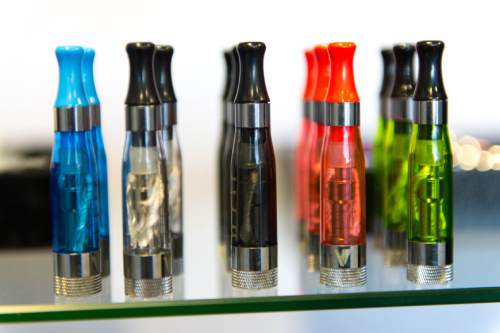This is an archived article that was published on sltrib.com in 2014, and information in the article may be outdated. It is provided only for personal research purposes and may not be reprinted.
The Utah Division of Consumer Protection appeared a tough, no-nonsense watchdog earlier this year when it cracked down on three Web-based electronic cigarette marketers accused of deceiving and ripping off customers. It issued citations for hundreds of violations carrying fines of $1.1 million.
Turns out the agency quietly settled the civil cases later for $31,150 in penalties — 2 percent of the original amount.
Officials won't say why they made that deal with companies that had been cited for more than 440 violations.
Department of Commerce spokeswoman Jennifer Bolton said the agency would "defer comment and let the full terms of the settlement agreements speak for themselves."
Those documents, released by the department in response to a records request from the nonprofit Truth in Advertising, don't spell out the reasons for the dramatically reduced fines, but indicate that two of the companies simply couldn't afford to pay more.
Vapex LLC, based in Bountiful, saw its $822,500 fine slashed to $16,450; Sinless Vapor of Heber City will pay just $4,700 of the original $235,000 fine; and OZN Web LLC of Phoenix and Salt Lake City had its $45,000 penalty reduced to $10,000.
The companies all agreed to take down unsubstantiated advertising claims, such as describing e-cigarettes as a "healthy alternative" to tobacco products that can be smoked "anywhere." They also promised to spell out their cancellation and return policies, to reimburse customers who should have been satisfied previously and to obtain the proper telemarketing permits in Utah and comply with state consumer laws.
"Hundreds of consumers got burned by these electronic cigarette companies who made false claims and offered free product trials, which in reality were not free as the online marketers racked up pricey automatic shipments to credit cards without consumers' knowledge or their consent," said Commerce Director Francine Giani in the agency's news release in late August.
The state fielded hundreds of consumer complaints against the companies, though the details are unknown. The Consumer Protection Division won't release those documents, saying it is bound by state law to keep them confidential.
That stance was rejected decisively Thursday by the state Records Committee, which handles appeals of Utah's open-records law. By a 5-1 vote, the panel ordered the division to turn those complaints over to Truth in Advertising.
Committee members pointed to the section of the Government Records Access and Management Act that states a document "is public unless otherwise expressly provided by statute."
One member, former state lawmaker Holly Richardson, tore into the consumer agency for what she said was an "offensive and condescending" presentation, which was "from my perspective an effort to jump through an incredible number of hoops to prevent the public from having access to records."
Another member, David Fleming, said he agreed the state was wrong in withholding the requested records but defended its arguments as "respectful" and professional.
It was a far different outcome than a similar hearing last month when the Records Committee unanimously denied Truth in Advertising's request for consumer complaints filed against a Provo multi-level marketing company called Wake Up Now. In that case, the company has not been publicly identified as the target of an investigation and no enforcement action had been taken, so confidentiality provisions in the law were deemed to apply.
Truth in Advertising has called the division's secrecy about complaints contrary to the interests of consumers it is charged with protecting, as well as out of line with the Federal Trade Commission and other states.
Without disclosure of complaints, consumers could be kept in the dark for weeks or months about a shady business and would have no way of knowing whether the state is taking appropriate action against such companies.
That line of reasoning caused division attorney Ché Arguello to bristle.
"They insinuate that there's something nefarious going on. I think that's inappropriate, I think it's dangerous and I think it's offensive," Arguello said. "I think we need to dispel that nonsense."
"In my opinion, and granted I'm their lawyer, Ms. Giani, the Department of Commerce and the Division of Consumer Protection, their reputations are beyond reproach."
Laura Smith, attorney for Truth in Advertising, said she is not accusing the agency of any wrongdoing.
"Truth in Advertising is certainly not insinuating that there is nefarious activity going on, but the issue is that we would have no way of knowing if there was," she said.
Giani wouldn't comment about the committee's order or whether the agency would appeal to district court.



